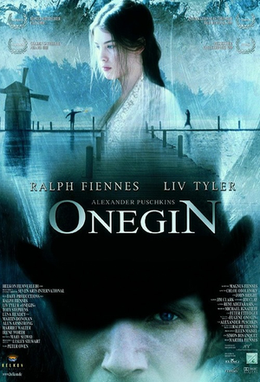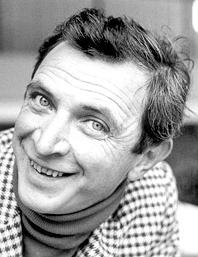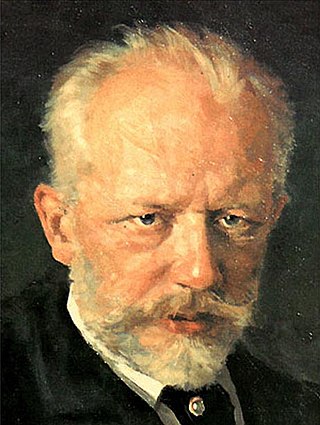
Eugene Onegin, A Novel in Verse is a novel in verse written by Alexander Pushkin. Onegin is considered a classic of Russian literature, and its eponymous protagonist has served as the model for a number of Russian literary heroes. It was published in serial form between 1825 and 1832. The first complete edition was published in 1833, and the currently accepted version is based on the 1837 publication.

Eugene Onegin, Op. 24, is an opera in 3 acts, composed by Pyotr Ilyich Tchaikovsky. The libretto, organised by the composer himself, very closely follows certain passages in Alexander Pushkin's 1825–1832 novel in verse, retaining much of his poetry. Tchaikovsky's friend Konstantin Shilovsky contributed M. Triquet's verses in Act 2, Scene 1, while Tchaikovsky himself arranged the text for Lensky's arioso in Act 1, Scene 1, and almost all of Prince Gremin's aria in Act 3, Scene 1.

Onegin is a 1999 British-American romantic drama film based on Alexander Pushkin's 1833 novel in verse Eugene Onegin, co-produced by British and American companies and shot mostly in the United Kingdom. Onegin is Martha Fiennes' directorial debut and stars her brother Ralph Fiennes in the role of Yevgeny (Eugene) Onegin, Liv Tyler as Tatiana and Toby Stephens as Lensky. Two other Fiennes siblings were involved in the project: Magnus Fiennes wrote the music and Sophie Fiennes appeared in a minor role.

John Cyril Cranko was a South African ballet dancer and choreographer with the Royal Ballet and the Stuttgart Ballet.

The Seasons, Op. 37a, is a set of twelve short character pieces for solo piano by the Russian composer Pyotr Ilyich Tchaikovsky. Each piece is the characteristic of a different month of the year in Russia. The work is also sometimes heard in orchestral and other arrangements by other hands. Individual excerpts have always been popular – Troika (November) was a favourite encore of Sergei Rachmaninoff, and Barcarolle (June) was enormously popular and appeared in numerous arrangements.
Neil Shicoff is an American opera singer and cantor and known for his lyric tenor singing and his dramatic, emotional acting.
Maria Eichwald is a Kazakhstani ballet dancer who has settled in Germany.
Kurt-Heinz Stolze was a German pianist, harpsichordist and composer.

Georgina Parkinson was an English ballet dancer and ballet mistress. She joined The Royal Ballet in 1957 and was promoted to principal dancer in 1962. Best known for dancing 20th-century works, she was a frequent collaborator of choreographer Kenneth MacMillan, and had also created roles for Frederick Ashton. In 1978, she accepted the invitation to become a ballet mistress at the American Ballet Theatre for a year, before assuming the position permanently in 1980. She also performed character roles with the American Ballet Theatre.
Eugene Onegin is 1959 Soviet opera film, produced by Lenfilm Studio, directed by Roman Tikhomirov, starring Vadim Medvedev, Igor Ozerov and Ariadna Shengelaya. The film is a screen version of the famous 1879 opera Eugene Onegin by Pyotr Tchaikovsky based on the 1825-1832 novel in verse by Alexander Pushkin.

Richard Cragun was an American ballet dancer, teacher and ballet director who performed with the Stuttgart Ballet in Germany from 1965 to 1996.

Marcia Haydée Salaverry Pereira da Silva is a Brazilian ballet dancer, choreographer and ballet director. She was prima ballerina of the Stuttgart Ballet under John Cranko and succeeded him as the company's director, serving from 1976 to 1995. She has been director of the Santiago Ballet since 1992.

Birgit Keil is a German ballet dancer. She was prima ballerina of the Stuttgart Ballet and was internationally known as The German Ballerina, She has been teaching at the Hochschule für Musik und Darstellende Kunst Mannheim and directing the ballet ensemble of the Badisches Staatstheater Karlsruhe.
Reid Bryce Anderson is a Canadian ballet dancer, ballet director and artistic director. He danced with the Stuttgart Ballet before returning as artistic director of the National Ballet of Canada in 1987. He returned to the Stuttgart Ballet as artistic director in 1996 and stepped down in 2018.
Ray Barra is an American former ballet dancer, a ballet master and ballet director. He was a soloist with the American Ballet Theatre and a principal dancer of the Stuttgart Ballet, where he created parts in creations by John Cranko, including Romeo in Romeo and Juliet with Marcia Haydée as Julia. After retiring from the stage due to an injury, he worked as a ballet master with the Berlin State Ballet, the ballet of the Frankfurt Opera, the Hamburg Ballet and the Spanish National Dance Company.
The Taming of the Shrew is a ballet in two acts choreographed by John Cranko to keyboard works by Domenico Scarlatti arranged and orchestrated by Kurt-Heinz Stolze. With scenery and costumes designed by Elizabeth Dalton, it was first presented as Der Widerspenstigen Zähmung by the Stuttgart Ballet at the Wṻrtembergische Staatstheater in Stuttgart on 16 March 1969.
Patricia Ruanne was a British ballerina, ballet mistress, teacher, repetiteur, and director.
Anne Woolliams was an English artistic director, ballet choreographer, dancer and teacher. She began studying dance at age five, performing with the Russian Opera and Ballet, the Ballet de la Jeunesse Anglaise and the St. James' Ballet and danced in the film The Red Shoes and stage musicals. Woolliams taught at Folkwang School, was appointed ballet mistress of Stuttgart Ballet, founded the John Cranko School with the director John Cranko, was the third artistic director of The Australian Ballet, was dean of dance at Victoria College of Arts, Melbourne and was artistic director of the Vienna State Ballet.
Initials R.B.M.E. is a ballet choreographed by John Cranko to Brahms' Piano Concerto No. 2. The ballet is plotless, and features four movements, each with a lead dancer. The ballet was created for the Stuttgart Ballet, and the title was named after the dancers that originated the four lead roles, Richard Cragun, Birgit Keil, Marcia Haydée and Egon Madsen. Initials R.B.M.E. premiered on 18 January 1972, at the Staatsoper Stuttgart. It was one of Cranko's most successful ballets, and one of his final works before his sudden death in 1973.
Onegin is a 2024 Russian historical romance film directed by Sarik Andreasyan, an adaptation of the novel in verse Eugene Onegin by Alexander Pushkin. The film stars Viktor Dobronravov, Denis Prytkov, Yelizaveta Moryak, Tatyana Sabinova, Alyona Khmelnitskaya, and Tatyana Lyutaeva in supporting roles.









